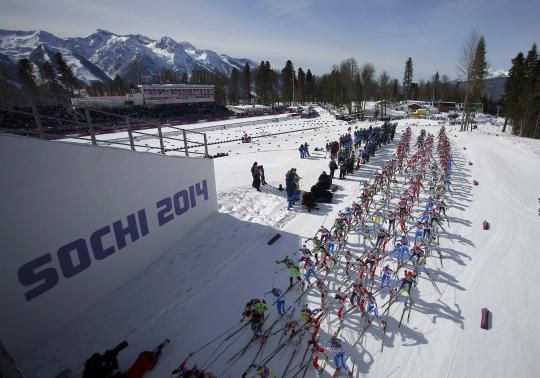Sochi Problems: Hold On, Wait… What Problems?

SOCHI, Russia -- Judging by the reports from social media and some mainstream media outlets this month, the 2014 Winter Olympics were either a “fiasco” or a “disaster” or both.
A Twitter account entitled “Sochi Problems” quickly gained traction, gaining 336,000 followers. Indeed, the 18-day Olympic Games in the Black Sea resort town were a major talking point for all the wrong reasons.
But here’s the rub: there actually weren’t all that many problems.
The closing ceremony is set for Sunday night, and when looking back on the Sochi Games it’s hard to find too many snags with the overall production.
Scroll through the Sochi Problems Twitter account, and nearly all of the recent postings do not show problems. They generally consist of positive comments about Olympic hockey.
There were some legitimate gripes surrounding the Games, such as the expensive and less-than-delicious cuisine, as well as bungled hotel reservations, and rooms that lacked things like light bulbs or functioning locks.
Inconsistent Internet connection would also be a prominent issue, particularly for the media.
There was also the mishap with one of the floating Olympic rings not opening during the opening ceremony, but few attending spectators who left Fisht Stadium felt anything other than bewilderment by the spectacular program.
Then there were real Sochi problems in which the Olympics became the solution, such as the stray dogs who roamed around the Olympic Park. Because of the reports and pressure from animal-rights activists, hundreds of dogs were rescued, though some dogs still remain on the streets.
But the overall hysteria over Sochi’s problems might have been the biggest problem of the Olympics. There was an outpouring of negativity and pessimism leading up to the start of the Games that many expected doom before competition got underway. For those following some of the outrage, it may have seemed as though the city was on the verge of a meltdown worse than Chernobyl.
Some of the problems turned out to not be problems at all. Multiple websites popped up that dispelled many of the lingering myths about the Games, such as gossipsochi.com.
Reports even circulated this week of a video revealing a wolf roaming through the halls of a U.S. athlete’s hotel. It turned out to be a prank perpetrated by comedy host Jimmy Kimmel.
In general, the Sochi Games seem to have been a great success. The volunteers have been helpful, the transportation has been consistent and comprehensive, the weather (depending on your sensibilities) has been splendid, and there have been no legitimate security concerns.
Many of the fears that there would be no snow, or that the anti-gay laws would be a distraction, failed to come to fruition. The events went along as scheduled, and few athletes complained about the conditions.
Meanwhile, the new arenas have received rave reviews, the streets are clean, and the crowds have been civil and pleasant.
Some will point to the controversy surrounding the women’s individual figure-skating finals in which Russian teenager Adelina Sotnikova won the gold despite most viewers believing that South Korean superstar Yuna Kim gave a better performance. It certainly appeared as though Kim was robbed of the gold, and that the contingent of judges and their scores were questionable.
But a controversy involving judges is nothing new to the Olympics. In the 1988 Summer Games in Seoul, American boxer Roy Jones Jr. appeared to have handily defeated South Korea’s Si-Hun Park, but the judges gave the gold to Park, who later apologized to Jones for the judging error. Even professional boxing has had plenty of scorecard controversies.
When comparing Sochi to more recent Olympics, many of the visitors appeared to favor the relatively small Russian town.
“I was at the Summer Olympics in London two years ago, and it’s actually warmer here in Sochi than it was in July in London, which was cold and damp. [Sochi] is pleasant and beautiful,” said Claudio Madrazo, from Long Island, N.Y, before the start of a U.S. hockey match.
Madrazo, who had attended several other Olympic Games, added that the Sochi Games “blew London away” describing Sochi as “colorful, well organized, and secure.” He also had no problems with his hotel.
“There was a little brown water, but that’s because it’s a brand-new hotel, and they never turned the water on to run it through,” he said.
Mike Moir of England attended the slopestyle event at the Mountain Cluster, and was pleased with how well everything was organized, and didn’t have hotel issues.
“It’s good here, man. No complaints,” said Chris, a Vancouver resident, who was tagging along with a friend who had a brother in the skating competition.
“The logistics are little bit long to get [to the Mountain Cluster.] It took us three hours to get here.
“But, you know what? The place looks good. It’s clean. The facilities are beautiful.”
© Copyright IBTimes 2025. All rights reserved.






















